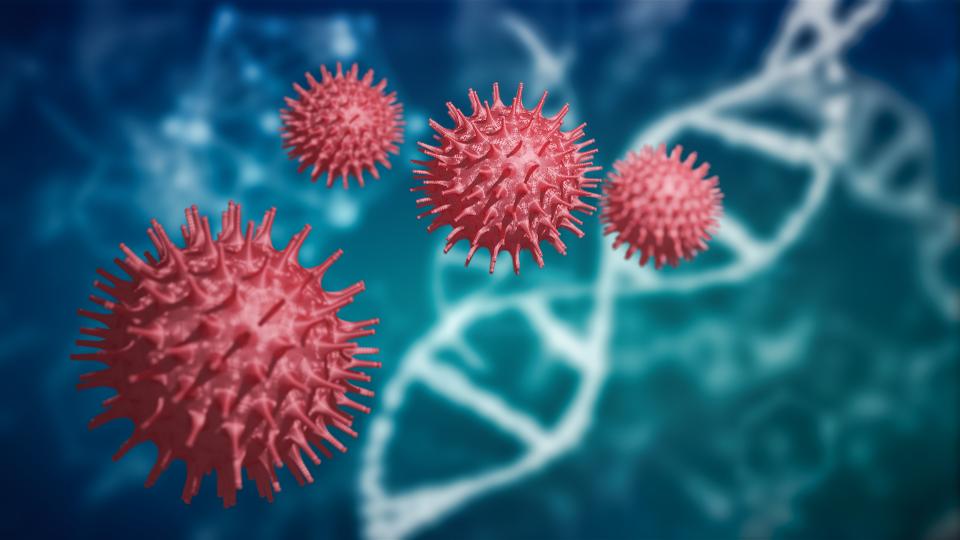COVID-19 Immuno-Genetics: University of Edinburgh Study Confirms That Genes Could Be Key To New COVID-19 Treatments
Source: COVID-19 Immuno-Genetics Dec 30, 2020 4 years, 3 months, 2 days, 8 hours, 43 minutes ago
COVID-19 Immuno-Genetics: A new study by researchers from University of Edinburgh-UK shows that genes could be key to new COVID-19 treatments.

Potential treatments for COVID-19 have been identified after the discovery of five genes associated with the most severe form of the disease.
The study findings were published in the peer reviewed journal: Nature Communications.
https://www.nature.com/articles/s41586-020-03065-y
According to the study team, genetic evidence is second only to clinical trials as a way to tell which treatments will be effective in a disease. Existing drugs that target the actions of the genes reveal which drugs should be repurposed to treat COVID-19 in clinical trials.
In the study, genes involved in two molecular processes ie antiviral immunity and lung inflammation were identified.
The breakthrough study findings will help physicians and researchers understand how COVID-19 damages lungs at a molecular level.
Scientist from the University of Edinburgh made the discovery by studying the DNA of 2,700 patients in 208 intensive care units (ICUs) in the UK.
The study team from the GenOMICC consortium ie a global collaboration to study genetics in critical illness compared the genetic information of COVID-19 patients in ICU with samples provided by healthy volunteers from other studies, such as UK Biobank, Generation Scotland and 100,000 Genomes.
The researchers found key differences in five genes of the ICU patients compared with samples provided by healthy volunteers.
Importantly the genes IFNAR2, TYK2, OAS1, DPP9 and CCR2 partially explain why some individuals become desperately sick with COVID-19, while others are not affected.
By identifying the genes, the study team was then able to predict the effect of drug treatments on patients, because some genetic variants respond in a similar way to particular drugs.
For instance, they showed that a reduction in the activity of the TYK2 gene protects against COVID-19. A class of anti-inflammatory drugs called JAK inhibitors, which includes the drug baricitinib, produces this effect.
The study team also discovered that a boost in the activity of the gene INFAR2 is also likely to create protection, because it is likely to mimic the effect of treatment with interferon ie proteins released by cells of the immune system to defend against viruses. However, experts caution that to be effective, patients might need the treatment early in disease.
From the study findings, the researchers say that clinical trials should focus on drugs that target these specific antiviral and anti-inflammatory pathways.
The project's chief investigator and Academic Consultant in Critical Care Medicine and Senior Research Fellow at University of Edinburgh's Roslin Institute, Dr Kenneth Baillie told Thailand Medical News, "This is a stunning realization of the promise of human genetics to help understand critical illness. Just like in sepsis and influenz
a, in COVID-19, damage to the lungs is caused by our own immune system, rather than the virus itself. Our genetic results provide a roadmap through the complexity of immune signals, showing the route to key drug targets. Our results immediately highlight which drugs should be at the top of the list for clinical testing. We can only test a few drugs at a time, so making the right choices will save thousands of lives. This work is only possible because of the generous contribution of the patients themselves and their families, research teams in NHS hospitals across the country, and the generous funding we've received from the public and organizations."
The GenOMICC (Genetics of Susceptibility and Mortality in Critical Care) platform started in 2015 as an open, global consortium of intensive care clinicians dedicated to understanding genetic factors that influence outcomes in intensive care from diseases such as SARS, influenza and sepsis. Throughout 2020 it has been focused on COVID-19 research in partnership with Genomics England.
Thailand Medical News is working parallel with numerous genetic and genomic research entities and is instead working with herbs and phytochemicals to target human host genetic variants that affect the pathogenesis and COVID-19 disease progression to prevent and treat COVID-19 via epigenetic manipulations and changes. We are targeting more than 34 human host genetic variants and have also tested the teas against a wide range of SARS-CoV-2 strains and mutations in terms of antiviral properties as well.
To date, Thailand Medical News has developed a patented therapeutic herbal tea that utilizes the widest range of herbs and phytochemicals and also nano technology to deliver a product whose efficacy has been demonstrated in numerous observation trials covering almost 11,000 patients so far in countries like Columbia, Peru, Brazil, Iran, Pakistan, India, Myanmar, Nepal, Argentina, Spain, Japan, And also in certain states in United States.
https://www.thailandmedical.news/news/new-therapeutic-teas-
We will be shortly going into randomized clinical trials and are at the moment distributing the teas to various countries to be used only by doctors in observational trials for the poor. The teas are also available to donors who help support our cause.
We are at the moment
desperate for various fundings ie:
-US$5,600 (Thai baht 162,000) to set up a parallel manual production line to scale up production as we only have one packing machine that is now having some issues and we need to purchase manual sealers and also proportion dispensers etc.
-US$62,000 to develop including research and production of a second line for Long COVID.
-US$240,000 for us to set up a proper lab and study facility in Northern Thailand for herbal research etc
All donors who donate a minimum of US$500 will receive the teas for themselves (ie 1 set for one person)
https://www.thailandmedical.news/p/sponsorship
We do hope that some kind and generous donors will respond to our pleas for help.
For more on
COVID-19 Immuno-Genetics, keep on logging to Thailand Medical News.
